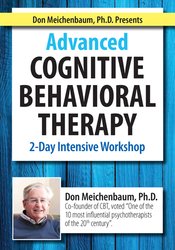

Don’t miss this opportunity learn from Dr. Donald Meichenbaum, one of the world’s leading psychotherapists and co-founder of Cognitive Behavioral Therapy (CBT).
Voted “one of the 10 most influential psychotherapists of the 20th century” and a recipient of the Lifetime Achievement Award from the American Psychological Association for his work on suicide prevention, Dr. Meichenbaum remains one of the most notable leaders in the field of psychotherapy today.
In this compelling recording, Dr. Meichenbaum will offer you the “untold” story of how CBT evolved, what it means for today’s clinician and considerations every therapist should contemplate when conducting psychotherapy.
He’ll then allow you access into decades’ worth of clinical knowledge and experience as he walks you through CBT-informed case conceptualization, treatment and management of some of the most difficult diagnoses on your caseload, including PTSD, substance abuse, personality disorders, depression, suicidality, and severe anger and aggression.
Under his expert guidance, you’ll gain skills and knowledge to:
Dr. Meichenbaum will not only give you invaluable concrete interventions to take back to your office the next day, he’ll do it in a way that reminds you of why you became a clinician in the first place.
Known for giving critically-minded, clinically astute and humorous lectures, Dr. Meichenbaum demonstrates the art and science of psychotherapy in a way only he can – you don’t want to miss this opportunity to learn from a legend in the field of psychotherapy!
| File type | File name | Number of pages | |
|---|---|---|---|
| Manual - Advanced Cognitive Behavioral Therapy (9.66 MB) | 111 Pages | Available after Purchase | |
| Manual (part 2) - Advanced Cognitive Behavioral Therapy (10.99 MB) | 119 Pages | Available after Purchase | |
| Manual - Advanced Cognitive Behavioral Therapy - French (9.66 MB) | 111 Pages | Available after Purchase | |
| Manual (part 2) - Advanced Cognitive Behavioral Therapy - French (10.99 MB) | 119 Pages | Available after Purchase | |
| Manual - Advanced Cognitive Behavioral Therapy - Italian (9.66 MB) | 111 Pages | Available after Purchase | |
| Manual (part 2) - Advanced Cognitive Behavioral Therapy - Italian (10.99 MB) | 119 Pages | Available after Purchase |

Don Meichenbaum, Ph.D., is Distinguished Professor Emeritus from the University of Waterloo, Ontario, Canada from which he took early retirement 20 years ago. He is presently Research Director of the Melissa Institute for Violence Prevention in Miami (Please see www.melissainstitute.org). He is one of the founders of Cognitive Behavior Therapy.
In a survey of clinicians reported in the American Psychologist he was voted “one of the ten most influential psychotherapists of the 20th century.” He has received a Lifetime Achievement Award from the Clinical Division of the American Psychological Association and was Honorary President of the Canadian Psychological Association.
He has presented in all 50 U.S. states and internationally. He has published extensively and most recently published Roadmap to Resilience: A Guide for Military Trauma Victims and Their Families (visit www.roadmaptoresilience.com). His other books include Treatment of Individuals with Anger Control Problems and Aggressive Behavior; Stress Inoculation Training; Facilitating Treatment Adherence; and The Unconscious Reconsidered.
He has consulted for various populations including veterans’ hospitals, the National Guard, psychiatric treatment centers for children, adolescents and adults, treatment center for individuals with traumatic brain injuries, torture victims, Native populations, deaf populations and school boards. See papers by Dr. Meichenbaum on www.melissainstitute.org (go to home page and click on Author’s Index and scroll to Meichenbaum).
Speaker Disclosures:
Financial: Donald Meichenbaum is Research Director of the Melissa Institute for Violence Prevention and Treatment. He is the Distinguished Professor Emeritus for the University of Waterloo, Ontario, Canada. Dr. Meichenbaum receives a speaking honorarium from PESI, Inc. He has no relevant financial relationships with ineligible organizations.
Non-financial: Donald Meichenbaum has no relevant non-financial relationship to disclose.
The Evolution of CBT: What It Means for Today’s Clinician
Setting the Stage for “Expert” Level Therapy: How to Achieve Lasting Change with Your Clients
CBT-Informed Case Conceptualization: Strategies for Comprehensive, Ongoing Assessment & Treatment Planning
Advanced CBT Interventions: Empower Clients to Identify Triggers, Unhook Schemas, Develop Coping Skills, and Make Healthier Decisions
Please wait ...